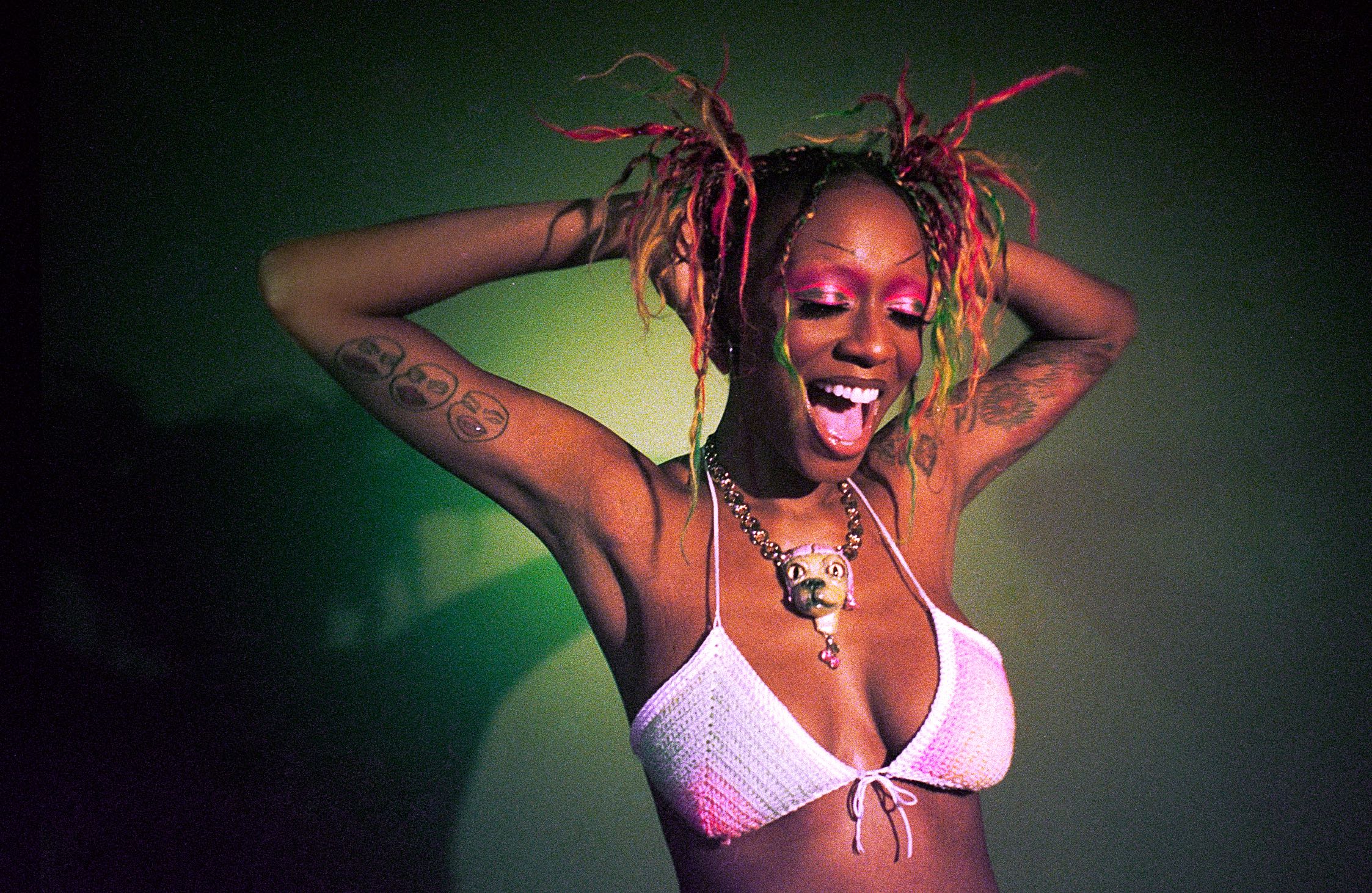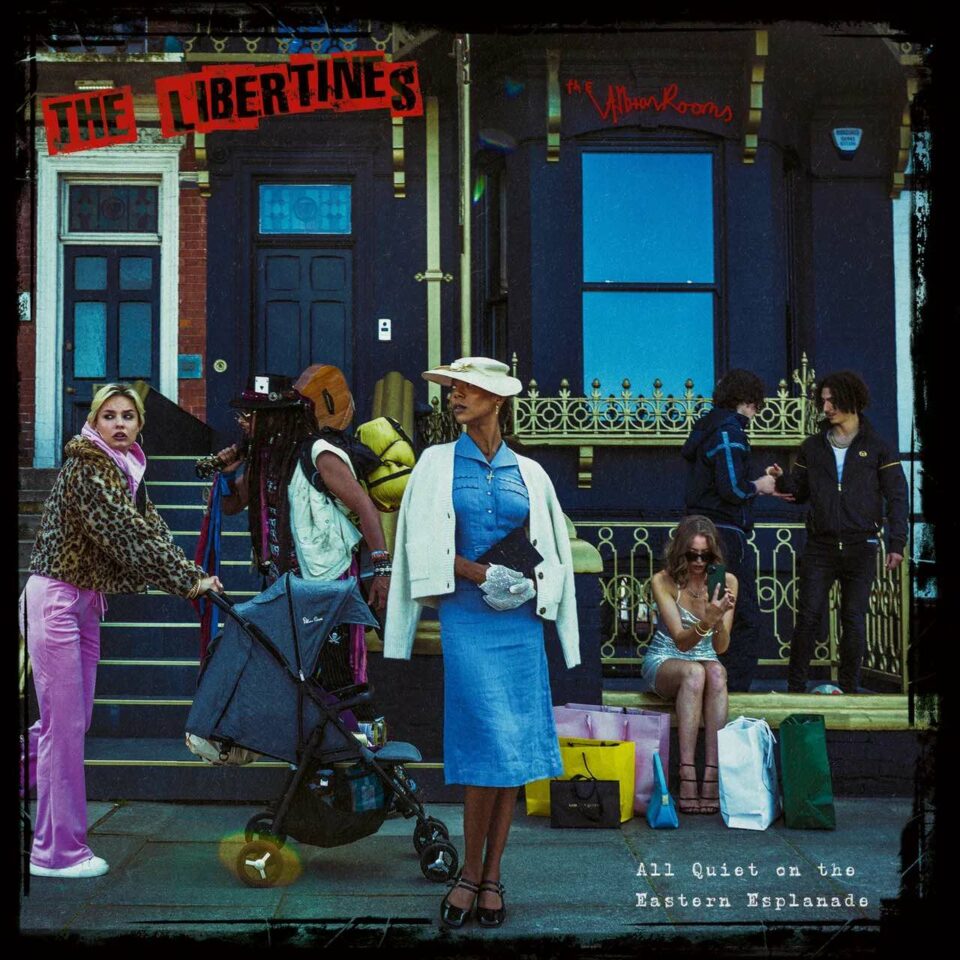Junglepussy has not held back this quarantine. Over the past few months, the rapper born Shayna McHayle has gone from cranking up the music and throwing one-woman dance parties at home, to picking up a bow and arrow to practice her newfound love of archery. This journey has led Junglepussy to set her eyes on an unexpected target. And her arrow landed right on the bullseye—her new album Jp4 is her most sonically ambitious project yet while emphasizing a heightened sense of introspection and self-assurance.
The NYC-born artist had no intentions of releasing an album this year. Finding comfort in the stillness of her home, and no external pressures of engineers in her face, she started recording Jp4 on her own over the summer. The album sweeps through a range of experimental sounds, taking influences from nu-metal, trip-hop, funk, and contemporary R&B. “I’m always transforming, why wouldn’t my music?” she says. “I sometimes get in my way and just hold onto stuff for too long, but Jp4 was a major release for me personally, emotionally, professionally, all of that. I really just wanted to say, ‘Yeah, look at the range. Don’t ever limit any Black artist. Don’t ever limit us.’”
Junglepussy developed a cult following early on in her career for her comedic skits and whimsical, sharp-witted delivery on 2014’s debut album Satisfaction Guaranteed and 2015’s follow-up Pregnant with Success. These projects were accompanied by assertive, high-tempo tracks that taught listeners the importance of self-care, unapologetic confidence, sexual liberation, and keeping men in check. On her third project, JP3, she ditched the fast-paced beats to explore a more melodic and mellow sound to accompany the album’s theme of healing. However, with Jp4, she finally found her sound that complements the vulnerability she’s been ready to share.
“I just had so much to say, but I didn’t want to say everything yet,” she tells me discreetly. “I wanted to open the door, open the window, and really let y’all in some more.” When you walk into the world of Jp4, you’ll find yourself piecing together parts of the puzzle that together make up Junglepussy, whether it’s through the lens of her emotions, her authenticity, or her role as a partner. “I always feel like I’m being vulnerable because it’s already such a thing just being me in the world, but there’s always layers to it.”
“Jp4 was a major release for me personally, emotionally, professionally, all of that. I really just wanted to say, ‘Yeah, look at the range. Don’t ever limit any Black artist. Don’t ever limit us.’”
Jp4 is the culmination of Junglepussy becoming comfortable with her overwhelming thoughts and reality. On the opener “Bad News” makes you feel like you’re trudging through a cemetery on a cold, foggy night with its backing of a distorted electric guitar. The line, “Watch all these bitches give me props when the casket drops,” she says is an ode to how Black women are treated in society. “We get celebrated when something tragic happens and everybody’s like, ‘Oh, it’s time for us to respect them and do all these things,’ but why not just do it when we’re existing?”
On other tracks, she recruits two collaborators to discover the other facets of herself. On “Out My Window,” Brooklyn R&B singer Ian Isiah shines on the chorus with his soothing, soulful voice that complements the warm feeling of Junglepussy’s self-love message. Later, Three 6 Mafia legend Gangsta Boo assists Junglepussy on “Stamina” to tap into her clever, sex-positive flow. “Baby, be my slut, suck me up immediately / I see you been eatin’ all your vegetables for me / You startin’ to taste like my favorite smoothie.”
According to Junglepussy, the songwriting process for Jp4 reflected the growth of her pen. “Before, I was getting out the words, and now, I really had the time to just sit with them and pull them,” she says. “A lot of these words, they all came to me. It wasn’t too premeditated. It just fell out my mouth.” In fact, some of the songs on the record have been floating around in her head for years. “A lot of these songs been in the making since, like, 2015. I just wasn’t ready. It just wasn’t time.”
At one point, Junglepussy takes an unfiltered approach to speaking her mind on “What You Want,” saying, “I can’t afford to mingle, it cost my my sanity / I be happy out the industry like I’m Kelis.” She realized since the beginning of her career, she’s had to come to terms with not caring about industry politics, being comfortable as an introvert, and not adhering to other’s expectations of who Junglepussy should be. “The industry wants you to entertain them until they dispose of you,” she says, but she’s more dynamic than that. “I had to take my time and come up with this custom GPS navigation to figure this all out.”
“[Black women] get celebrated when something tragic happens and everybody’s like, ‘Oh, it’s time for us to respect them and do all these things,’ but why not just do it when we’re existing?”
The lesson she’s gained from this is to always trust her instincts. “I would always feel like my taste wasn’t valuable, or what I liked needed some extra confirmation,” she says. “It’s like, ‘Wait no, that shit’s fire because I said so.’” Yet one woman that believed in Junglepussy since the very beginning and encouraged her creative outlets at a young age is her mother. “She just might be the President of JP.”
Junglepussy doesn’t come from a family background of musicians, aside from her grandfather playing the accordion in church when she was younger. However, her drive to write stories stems from her early childhood when her mother used to buy her and her sister journals. She still has all of those journals to this day. “When I go back and I read those journals, I have composition notebooks that are filled up with stories,” she says. “I’m like, ‘Mommy did that.’ She always made sure I had papers around. It was always paper, pencil, and markers, and I would just be so hype off of all that.”
“The industry wants you to entertain them until they dispose of you. I had to take my time and come up with this custom GPS navigation to figure this all out.”
Junglepussy never expected she would be put in a position to give advice and guide younger generations through her words. But in June, she received the opportunity to be the commencement speaker for the 2020 graduating class of New Design High School, her Manhattan alma mater. “I decided to speak to them how I would speak to my little sister or my little brother—just encouragement and remind them that our power is our power. We have it unconditionally, regardless of any structure or institution.”
Junglepussy has been able to mentor younger creatives with navigating the industry, something she yearned for earlier in her career. “I was feening for a mentor, feening for guidance, feening for leadership, but you just don’t come with it.” It took her time to realize that her missing piece was building those relationships and putting herself out there. But after seven years of experience in the industry, she’s been able to help younger artists figure out how to work with producers and advocate for their art. “We all have so many experiences that can help just by sharing, essentially building a community where we feel safer and we can come to for that support unconditionally,” she says. “It should be a normal thing.” FL









